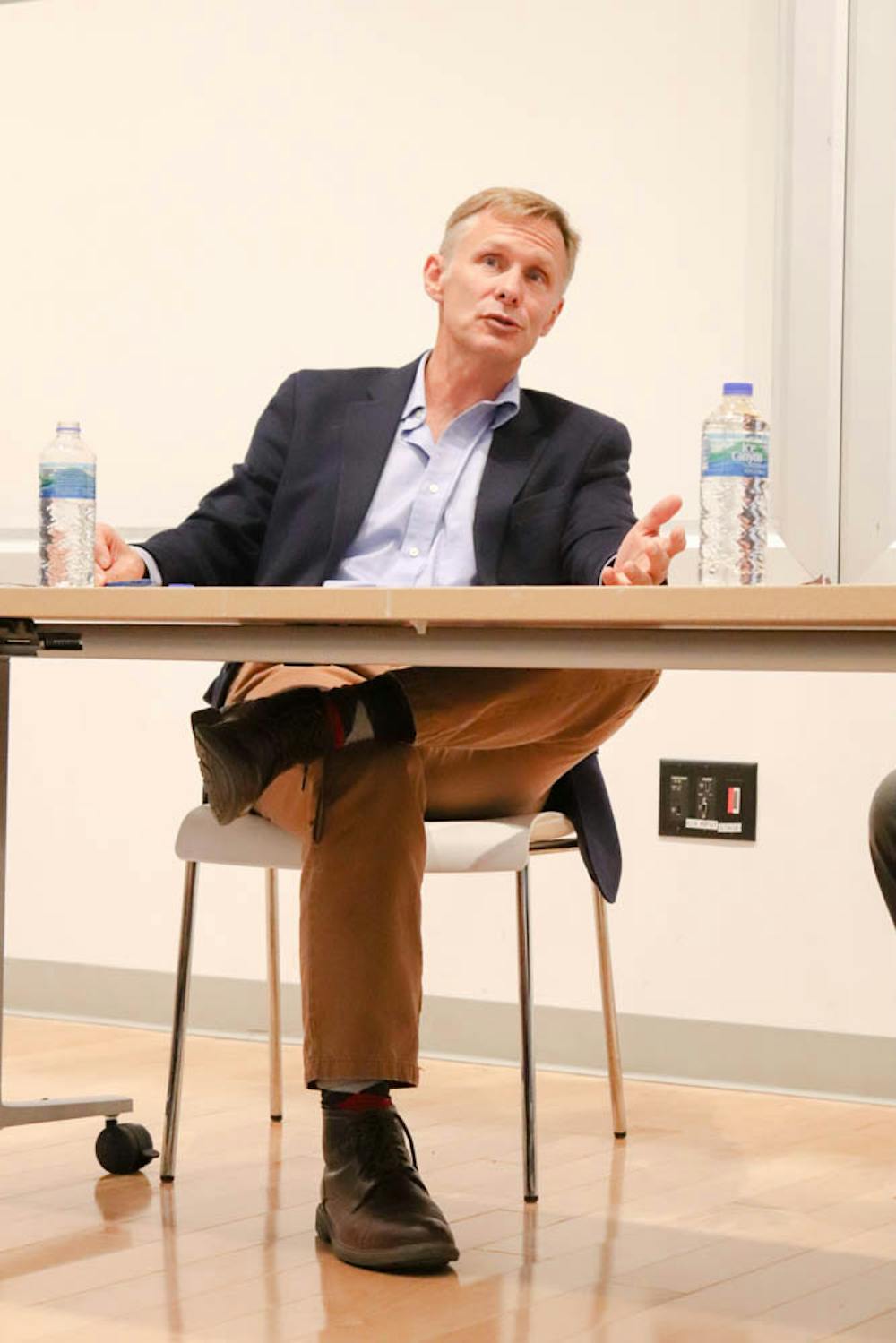Immediately following his inauguration, President Trump dismissed all foreign diplomats appointed by the administration of former President Obama. As the “number two” at the U.S. Embassy in Beijing, David Rank assumed the responsibilities of Ambassador.
Rank spoke before an audience of about 40 students at a talk hosted by the Political Science Departmental Undergraduate Group at 85 Waterman Street Tuesday. He sat down for a candid conversation about careers in the Foreign Service and the state of U.S. foreign policy with former Ambassador to Saudi Arabia Chas Freeman, currently a senior fellow at the Watson Institute for International and Public Affairs.
Rank, a foreign service officer who returned to Beijing on assignment six times over the course of his career, rose through the ranks to become second-in-command at the U.S. Embassy in China. Then, “as soon as I woke up on the morning of (Jan. 20, 2017), I became chargé d’affaires,” or acting U.S. ambassador to China, Rank said.
But there was a problem. “I couldn’t imagine taking an ambassadorship under the current president,” Rank said. He led the U.S. Embassy in Beijing until June when Trump announced his decision to pull the US out of the Paris Climate Accords.
“As a parent, patriot and Christian, I could not in good conscience be involved in any way, no matter how small, with the implementation of that decision,” Rank said in an op-ed published in the Washington Post in June, which said that Trump’s decision would degrade the US’s authority as global leader in diplomacy and science. Rank resigned from the Foreign Service in protest of the decision, ending a 27-year career that brought him through Greece, Afghanistan and China.
As Freeman put it, Rank “jumped out of a plane without a parachute.” But, he joked, “you’re not on the street yet.”
“It may come,” Rank quipped in response.
The stories Rank and Freeman shared from their time in Beijing revealed that they faced vastly different circumstances despite serving in the same position at the U.S. Embassy in China. Freeman, who told The Herald he served as acting ambassador to China at a time when “China and the United States shared a common interest in frustrating Soviet policies,” described a friendly environment in Beijing that allowed him to form strong personal relationships with his Chinese counterparts.
Rank, on the other hand, said it became increasingly difficult to establish close relationships with his Chinese counterparts as the administration of Chinese President Xi Jinping progressed. “The U.S.-China relationship is much bigger today,” Rank explained, adding that “the atmosphere is much more tense now” for American diplomats in China.
“There are certainly less empathetic regimes in both countries (today),” Freeman agreed.
Rank said he didn’t expect China to become a global economic power when he first expressed interest in serving the U.S. diplomatic mission in Beijing. But having been accepted to the Foreign Service in 1989, which he described as a “momentous year in Chinese history,” Rank witnessed the rise of China over the course of his career.
Freeman tailored much of his conversation with Rank toward political science students interested in joining the Foreign Service by asking Rank what led him to pursue a diplomatic career. “I was a junior in history with no marketable skills,” Rank said. “I remember leaving my undergraduate studies and wanting to lead an extraordinary life. … The Foreign Service gives you that opportunity.”
Rank described his career as full of excitement and uncertainty. “The day that the list of the next jobs came out was always my favorite moment,” Rank said, emphasizing the thrill of wondering, “Where will I be in the next six months?”
Freeman echoed the sentiment, warning that “if you join the foreign services, you can’t really control where you end up. They turn to a world map and fling a dart at it,” he joked — “and you end up in places you never expected to be.”
Rank saw this uncertainty as one of the best parts of his job. “The world is open to you,” he said.
“You might be motivated by a desire to serve your country, or you might be motivated by a desire to constantly change your work environment,” Freeman said. “In either case, you might get to be a part of history.”
When Freeman opened the conversation to questions from the audience, Rank touched on a variety of topics including his involvement in securing the release of Sergeant Bowe Bergdahl from Taliban captivity, the language training he often went through before new foreign assignments and the role of China in the increasingly tense conflict between the United States and North Korea.
David Golden ’19, who attended the event, said he was impressed with Rank’s deep knowledge of the varied topics he discussed. “He had very measured and interesting responses to questions,” Golden added. “He backed his claims up with evidence and didn’t just make assertions.”
Throughout their conversation, Rank and Freeman expressed concerns over the unstable state of American foreign policy. “We have erratic leadership. We have a government that can’t make decisions because of gridlock. We’re looking to your generation to clean up the mess we’ve made,” Freeman said, addressing the students in the audience directly.
“The US is not ordained by God to be the leader of the free world or the driver of the global system,” Rank said, arguing that our failure to honor international agreements such as the Paris Climate Accords reduces our global authority. “I worry that the breakdown of global structures will lead to the breakdown of global economics and political norms,” he added.





